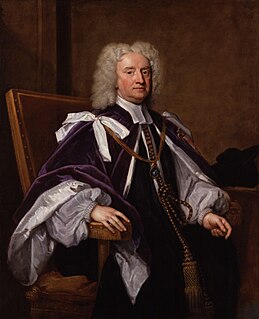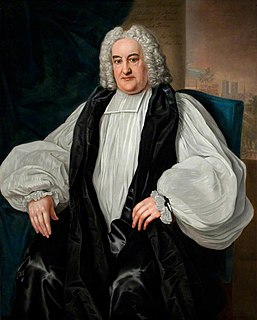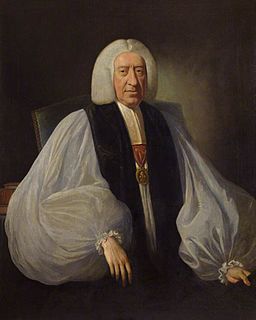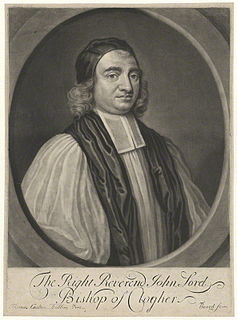
John Douglas was a Scottish scholar and Anglican bishop.

Marquess of Bristol is a title in the Peerage of the United Kingdom held by the Hervey family since 1826. The Marquess's subsidiary titles are: Earl of Bristol, Earl Jermyn, of Horningsheath in the County of Suffolk (1826), and Baron Hervey, of Ickworth in the County of Suffolk (1703). The Barony of Hervey is in the Peerage of England, the Earldom of Bristol in the Peerage of Great Britain and the Earldom of Jermyn in the Peerage of the United Kingdom. Earl Jermyn is used as courtesy title by the Marquess's eldest son and heir. The Marquess of Bristol also holds the office of Hereditary High Steward of the Liberty of St. Edmund. The present holder of these titles is Frederick Hervey, the 8th Marquess and 12th Earl of Bristol.

Sir Jonathan Trelawny, 3rd Baronet was a British Bishop of Bristol, Bishop of Exeter and Bishop of Winchester. Trelawny is best known for his role in the events leading up to the Glorious Revolution which are sometimes believed to be referenced in the Cornish anthem "The Song of the Western Men".

William Howley was a clergyman in the Church of England. He served as Archbishop of Canterbury from 1828 to 1848.

John Hoadly was an Anglican divine in the Church of Ireland. He served as Bishop of Ferns and Leighlin, as Archbishop of Dublin, and as Archbishop of Armagh from 1742 until his death.

Zachary Pearce, sometimes known as Zachariah, was an English Bishop of Bangor and Bishop of Rochester. He was a controversialist and a notable early critical writer defending John Milton, attacking Richard Bentley's 1732 edition of Paradise Lost the following year.
Robert Skinner was an English bishop successively of Bristol, of Oxford, and of Worcester.

Sir Thomas Gooch, 2nd Baronet (1674–1754) was an English bishop.
Samuel Squire was a Bishop of the Church of England and a historian.
Robert Butts (1684–1748) was an English churchman and strong partisan of the administration of Sir Robert Walpole, successively Bishop of Norwich and Bishop of Ely.

William Gulston (1636-1684) was an English churchman, bishop of Bristol from 1679.

William Bradshaw was a Welsh churchman, who in the course of his career served as Dean of Christ Church, Oxford, and Bishop of Bristol.
Harry William Blackburne DSO, MC was an Anglican clergyman, Dean of Bristol from 1934 to 1951.
John Law (1745–1810) was an English mathematician and clergyman who began his career as a Fellow of Christ's College, Cambridge, and went on to become chaplain to the Lord Lieutenant of Ireland and Church of Ireland bishop of Clonfert and Kilmacduagh (1782–1787), Killala and Achonry (1787–1795), and finally of Elphin (1795–1810).
Charles Este, (1696–1745), was bishop of Ossory (1735–1740) and subsequently of Waterford and Lismore (1740–1745).
The Rt Rev William Dickson (1745–1804) was Bishop of Down and Connor from 1784 to 1804. He was educated at Eton and Hertford College, Oxford and died in post on 19 September 1804.
Arthur Bedford (1668–1745), was an English miscellaneous writer and Vicar. He is most notable for his pamphlets against the Theatre and popular music.

John Sterne (1660–1745) was an Irish churchman, bishop of Dromore from 1713 and then bishop of Clogher from 1717.
Charles Rose was an Episcopalian clergyman who served in the Scottish Episcopal Church as the Bishop of Dunblane (1774–1791) and Bishop of Dunkeld (1776–1786).
Cutts Barton, (1706–1780) D.D. was an English cleric, Dean of Bristol from 1763 to 1780.
This page is based on this
Wikipedia article Text is available under the
CC BY-SA 4.0 license; additional terms may apply.
Images, videos and audio are available under their respective licenses.









